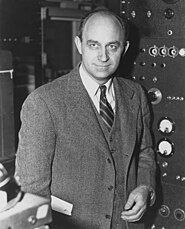Portal:Energy/Selected biography/2
Enrico Fermi (September 29, 1901 – November 28, 1954) was an Italian physicist most noted for his work on the development of the first nuclear reactor, and for the development of quantum theory. Fermi won the 1938 Nobel Prize in Physics for his work on induced radioactivity.
Fermi was well-known for his simplicity in solving problems. Whenever possible, he avoided complicated mathematics and obtained quick results based on order of magnitude estimates. Fermi also meticulously recorded his calculations in notebooks, and later used to solve many new problems that he encountered based on these earlier known problems.
After accepting the 1938 Nobel Prize in Stockholm, Fermi immigrated to New York with his family to escape the anti-Semitic laws of Fascist Italy, as his wife Laura was Jewish.
After working at Columbia University, Fermi went to the University of Chicago and began studies that led to the construction of the world's first nuclear reactor Chicago Pile-1 (CP-1). The first artificial, self-sustaining, nuclear chain reaction was initiated within CP-1, on December 2, 1942.

